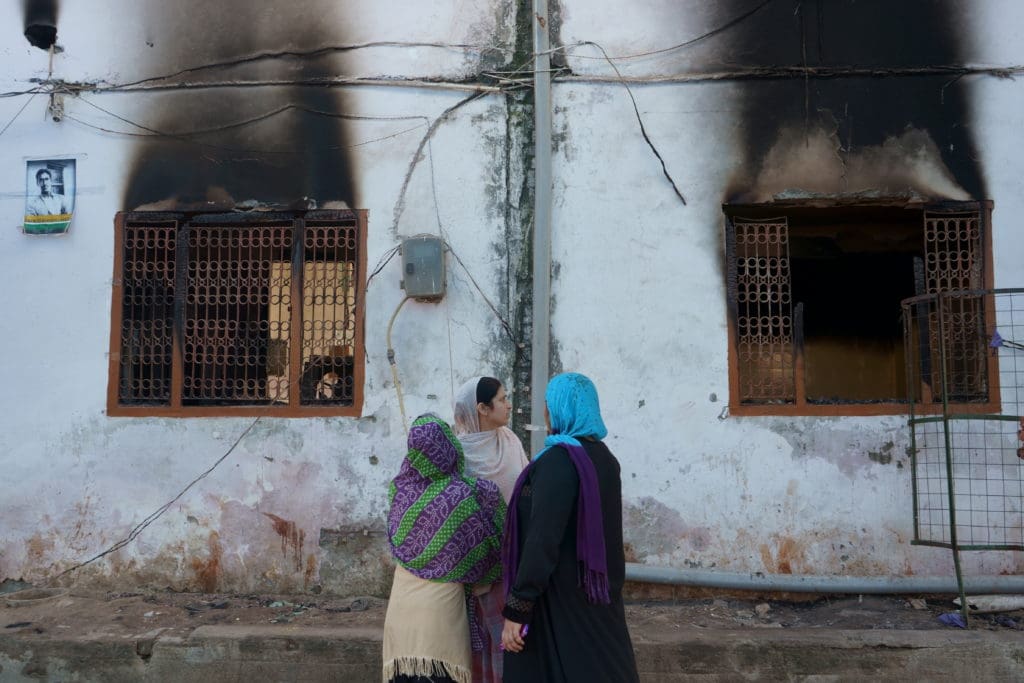
The petition also cites inflammatory speeches made by a Hindu seer, Yati Narsinghanand Saraswati, alleged anti-Muslim slogans made at a rally in the capital in August last year, and the ongoing protests against weekly Friday prayers on public grounds in Gurugram, near Delhi.
It also cites protests in the north-eastern state of Tripura against attacks on Hindus in Bangladesh, and other speeches and remarks as examples of hate speech against Muslims in the country.
Video snippets from the event in Haridwar were widely shared across social media, which showed some speakers making alleged hate speeches, with some of them calling for violence against Muslims.
As another election season looms, hate speech by high-ranking politicians is surging – by 1130 percent since the Modi government came into power in 2014.https://t.co/m98TBoQtcK
— Indian American Muslim Council (@IAMCouncil) January 13, 2022
Open calls to kill Muslims so that a Hindu nation can be established were allegedly made at the event. Speakers also reportedly targeted former prime minister Manmohan Singh and invoked Mahatma Gandhi’s assassin Nathuram Godse.
One delegate, Prabodhanand Giri, the head of a hard-line Hindu group who is often photographed with senior members of the ruling Bharatiya Janata Party called for a “cleansing” and for those present to be “ready to die or kill.”
“Like Myanmar, the police, politicians, the army and every Hindu in India must pick up weapons and do this cleansing. There is no other option left,” he is heard to say.
This, along with a few other incidents of hate speech across the spectrum, have once again brought to the fore the discussion around hate speech and the laws relating to inciting hate against communities.
‘Religious attack’
“This is nothing but an attack on religious identity and a normalisation of othering and the dehumanisation of Muslims,” said rights activist Saira Shah Haleem.
“I feel that it is being done deliberately. What is happening in the country is not happening by chance but is a deliberate strategy and effort and that is what makes it extremely reprehensible,” said actor and director Ratna Pathak Shah.
Though the ruling BJP did not come out and openly denounce the pronouncements, it denies accusations that its agenda is to turn officially secular and pluralistic India into an ethnic Hindu nation.
However, the president of Jamiat Ulama-i-Hind, India’s largest socio-religious Muslim organisation, accused the government of turning a blind eye to hate speech against the Muslim community.
Haridwar #DharamSansad organiser #YatiNarsinghanand was caught on camera threatening Uttarakhand police personnel after they arrested his aide Wasim Rizvi alias Jitendra Tyagi in the hate speech case.
— Hindustan Times (@htTweets) January 14, 2022
Surge in hate speech
Data from the National Crime Records Bureau reports indicate that the number of cases registered for promoting enmity between groups increased by more than four-fold between 2015 and 2020, when the BJP has been in power.
Incidentally, the surge of hate speech comes at a time when five states go to the polls next month including the crucial northern state of Uttar Pradesh.
The Election Commission of India (ECI) has already cautioned political parties over hate speech and said that it is keeping tabs on social media posts.
An analysis by NDTV hate speech tracker data showed that since Prime Minister Narender Modi’s government came to power in 2014, “VIP” hate speech has surged.
The hate speech tracker has been chronicling statements made by high-ranking political functionaries including ministers, chief ministers, lawmakers, governors and that are clearly communal, casteist, or make calls to violence since 2009.
With the political class generally reluctant to condemn bigotry and intolerance, the courts and the ECI will have to go the extra mile to ensure exemplary action against those spreading hatred and inciting violence in the name of religion.
This story first appeared on rfi.fr





